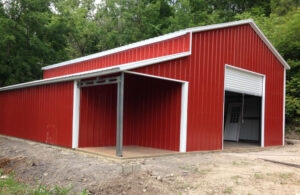
When it comes to constructing barns, the choice between metal and wood is a pivotal decision that directly impacts the barn’s durability, maintenance, and overall longevity. In this battle of building materials, metal barns stand out as the superior choice for a variety of compelling reasons.
Durability and Longevity
Metal barns outshine their wooden counterparts in terms of durability. Metal is resistant to rot, pests, and fire, ensuring that the structure remains intact for decades. Unlike wood, which is susceptible to decay and insect infestations, metal barns require minimal maintenance, making them a cost-effective and long-lasting investment.
Strength and Stability
Metal barns are incredibly robust, capable of withstanding extreme weather conditions, including heavy snow loads and high winds. Metal structures are engineered to be structurally stable, reducing the risk of collapses or damages during adverse weather events. Wood, on the other hand, is vulnerable to warping, bending, and cracking, compromising the barn’s structural integrity over time.
Customization and Flexibility
Metal barns offer unparalleled customization options. They can be tailored to accommodate various designs, sizes, and functionalities. Whether you need additional storage space, a livestock shelter, or a workshop, metal barns can be adapted to suit your specific requirements. This flexibility in design ensures that your barn is not just a functional structure but also an aesthetically pleasing addition to your property.
Environmentally Friendly
Metal barns are environmentally friendly choices. Most metal used in construction is recyclable, reducing the demand for new resources and minimizing the environmental impact. Additionally, metal barns often have reflective coatings that improve energy efficiency, reducing the need for artificial lighting and climate control within the structure.
Cost-Effectiveness
While the initial cost of metal barns might be slightly higher than wooden barns, the long-term savings are substantial. Metal barns require minimal maintenance and repair, eliminating the recurring costs associated with wood, such as painting, sealing, and pest control. Over the barn’s lifespan, these savings accumulate, making metal barns a more cost-effective choice in the long run.
Fire Resistance
Wooden barns are highly susceptible to fires, posing a significant risk to both the structure and its contents. Metal barns, being non-combustible, provide superior fire resistance. This quality not only protects your property but also ensures the safety of your livestock, equipment, and stored goods.
